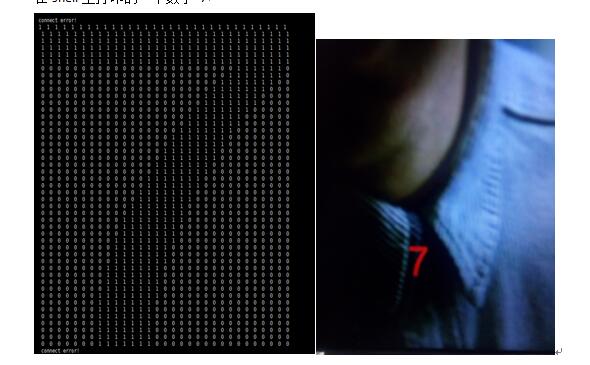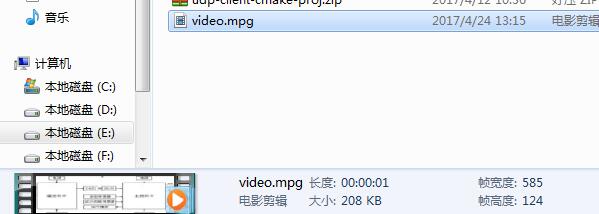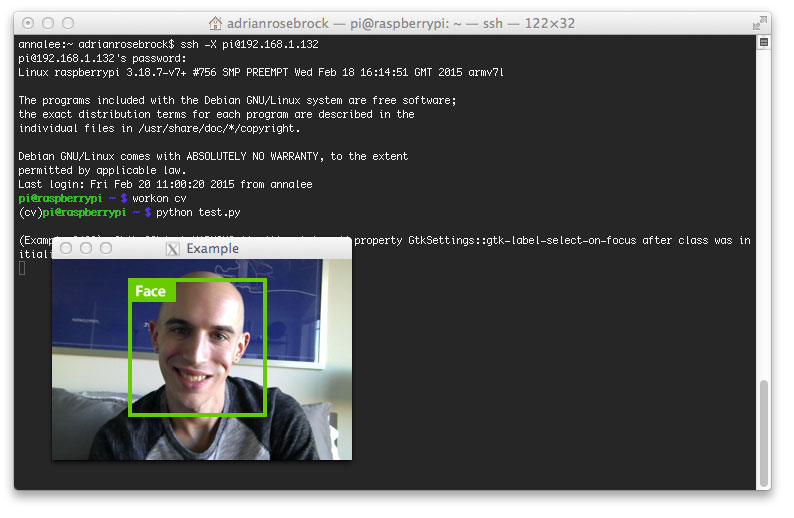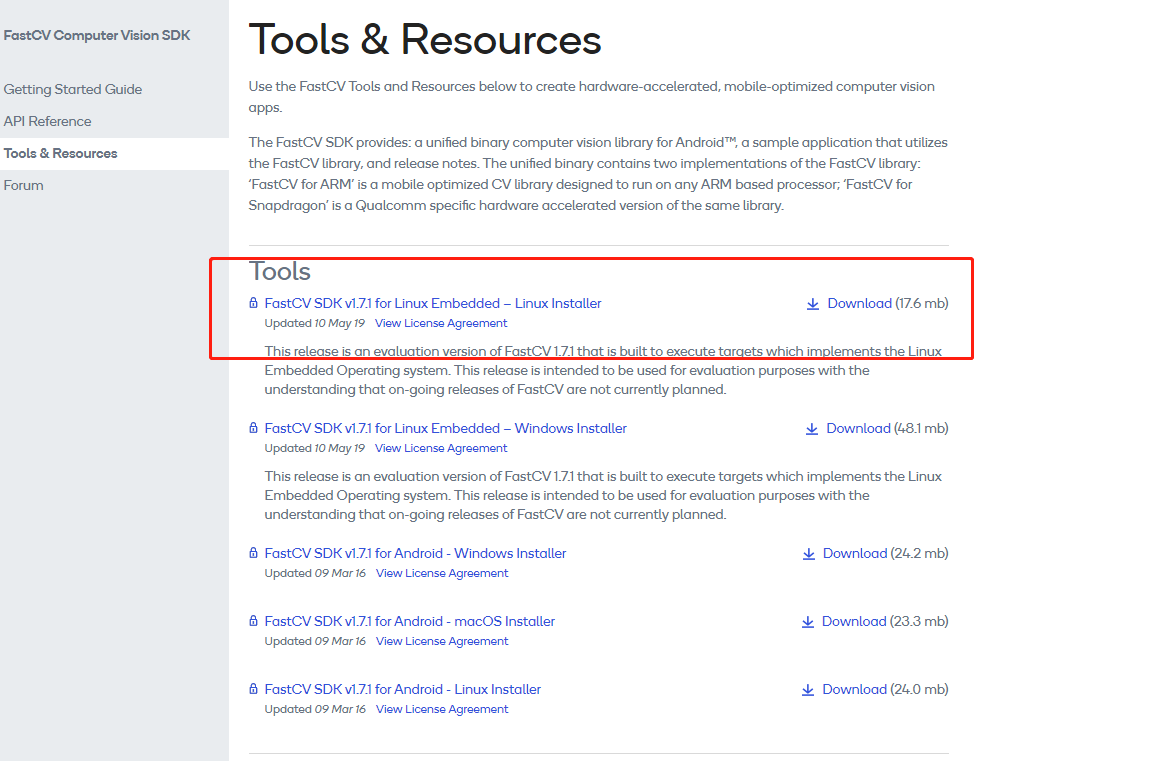arm Linux usb摄像头采集程序保存为bmp图片
没有使用液晶屏 没有使用framebuffer,直接调用 v4l2 架构 和内存映射
将usb的摄像头直接采集采集的为YUYV 格式经转换为RGB888的格式再编码为bmp 的格式 。
直接 编译完毕后 ./程序即可
源码上传
/*
* V4L2 video capture example
*
* This program can be used and distributed without restrictions.
*
* This program is provided with the V4L2 API
* see http://linuxtv.org/docs.PHP for more information
* http://www.linuxtv.org/downloads/v4l-dvb-apis/capture-example.html
* modify by mayy02@163.com
*/
#include <stdio.h>
#include <stdlib.h>
#include <string.h>
#include <assert.h>
#include <getopt.h> /* getopt_long() */
#include <fcntl.h> /* low-level i/o */
#include <unistd.h>
#include <errno.h>
#include <sys/stat.h>
#include <sys/types.h>
#include <sys/time.h>
#include <sys/mman.h>
#include <sys/ioctl.h>
#include <linux/videodev2.h>
#include <time.h>
#define CLEAR(x) memset(&(x), 0, sizeof(x))
#define FALSE 0
#define TRUE 1
#define FRAME_CNT 4
#define BMP "cam1.bmp"
#define IMAGEWIDTH 640
#define IMAGEHEIGHT 480
typedef unsigned char BYTE;
typedef unsigned short WORD;
typedef unsigned long DWORD;
/**/
#pragma pack(push)
#pragma pack(2)
typedef struct tagBITMAPFILEHEADER{
WORD bfType; // the flag of bmp, value is "BM"
DWORD bfSize; // size BMP file ,unit is bytes
DWORD bfReserved; // 0
DWORD bfOffBits; // must be 54
}BITMAPFILEHEADER;
typedef struct tagBITMAPINFOHEADER{
DWORD biSize; // must be 0x28
DWORD biWidth; //
DWORD biHeight; //
WORD biPlanes; // must be 1
WORD biBitCount; //
DWORD biCompression; //
DWORD biSizeImage; //
DWORD biXPelsPerMeter; //
DWORD biYPelsPerMeter; //
DWORD biClrUsed; //
DWORD biClrImportant; //
}BITMAPINFOHEADER;
typedef struct tagRGBQUAD{
BYTE rgbBlue;
BYTE rgbGreen;
BYTE rgbRed;
BYTE rgbReserved;
}RGBQUAD;
#pragma pack(pop)
enum io_method {
IO_METHOD_READ,
IO_METHOD_MMAP,
IO_METHOD_USERPTR,
};
struct buffer {
void *start;
size_t length;
};
static char *dev_name;
static enum io_method io = IO_METHOD_MMAP;
static int fd = -1;
struct buffer *buffers;
static unsigned int n_buffers;
static int out_buf;
static int force_format;
static int frame_count = 70;
static void errno_exit(const char *s)
{
fprintf(stderr, "%s error %d, %s\n", s, errno, strerror(errno));
exit(EXIT_FAILURE);
}
static int xioctl(int fh, int request, void *arg)
{
int r;
do {
r = ioctl(fh, request, arg);
} while (-1 == r && EINTR == errno);
return r;
}
int yuyv_2_rgb888(unsigned char *inp, int size, unsigned char *outp)
{
int i,j;
unsigned char y1,y2,u,v;
int r1,g1,b1,r2,g2,b2;
for(i=0;i<480;i++)
{
for(j=0;j<320;j++)
{
y1 = *( inp + (i*320+j)*4);
u = *( inp + (i*320+j)*4 + 1);
y2 = *( inp + (i*320+j)*4 + 2);
v = *( inp + (i*320+j)*4 + 3);
r1 = y1 + 1.042*(v-128);
g1 = y1 - 0.34414*(u-128) - 0.71414*(v-128);
b1 = y1 + 1.772*(u-128);
r2 = y2 + 1.042*(v-128);
g2 = y2 - 0.34414*(u-128) - 0.71414*(v-128);
b2 = y2 + 1.772*(u-128);
if(r1>255)
r1 = 255;
else if(r1<0)
r1 = 0;
if(b1>255)
b1 = 255;
else if(b1<0)
b1 = 0;
if(g1>255)
g1 = 255;
else if(g1<0)
g1 = 0;
if(r2>255)
r2 = 255;
else if(r2<0)
r2 = 0;
if(b2>255)
b2 = 255;
else if(b2<0)
b2 = 0;
if(g2>255)
g2 = 255;
else if(g2<0)
g2 = 0;
*(outp + ((480-1-i)*320+j)*6 ) = (unsigned char)b1;
*(outp + ((480-1-i)*320+j)*6 + 1) = (unsigned char)g1;
*(outp + ((480-1-i)*320+j)*6 + 2) = (unsigned char)r1;
*(outp + ((480-1-i)*320+j)*6 + 3) = (unsigned char)b2;
*(outp + ((480-1-i)*320+j)*6 + 4) = (unsigned char)g2;
*(outp + ((480-1-i)*320+j)*6 + 5) = (unsigned char)r2;
}
}
printf("change to RGB OK \n");
}
int file_index = 0 ;
/* add by mayy : 640*480 */
void save_as_bmp(char *bufp, int size)
{
int fclen = 0 ;
FILE *log_file = NULL ;
char logpath[256] = "";
char logname[512] = "" ;
static int count = 0 ;
int index = 0 ;
int packet_len = 0 ;
FILE * fp1,* fp2;
struct stat st;
time_t t;
struct tm * lt;
time (&t);//获取Unix时间戳。
lt = localtime (&t);//转为时间结构。
BITMAPFILEHEADER bf;
BITMAPINFOHEADER bi;
unsigned char output_buffer[IMAGEWIDTH*IMAGEHEIGHT*3];
//get_tracklog_storage_path(VIDEO_PICTUTE_DEFAULT_STORAGE_PATH,logpath) ;
sprintf(logname,"/media/mmcblk0p1/%d%d%d_%d%d%d.bmp",lt->tm_year+1900, lt->tm_mon, lt->tm_mday, lt->tm_hour, lt->tm_min, lt->tm_sec) ;
/*
if (-1 == stat(logname, &st)) {
fp1 = fopen(logname, "wb");
}else {
file_index ++ ;
sprintf(logname,"/media/mmcblk0p1/cam_%d.bmp",file_index) ;
fp1 = fopen(logname, "wb");
}
*/
fp1 = fopen(logname, "wb");
if(!fp1){
printf("open "BMP"error\n");
return;
}
//Set BITMAPINFOHEADER
bi.biSize = 40;
bi.biWidth = IMAGEWIDTH;
bi.biHeight = IMAGEHEIGHT;
bi.biPlanes = 1;
bi.biBitCount = 24;
bi.biCompression = 0;
bi.biSizeImage = IMAGEWIDTH*IMAGEHEIGHT*3;
bi.biXPelsPerMeter = 0;
bi.biYPelsPerMeter = 0;
bi.biClrUsed = 0;
bi.biClrImportant = 0;
//Set BITMAPFILEHEADER
bf.bfType = 0x4d42;
bf.bfSize = 54 + bi.biSizeImage;
bf.bfReserved = 0;
bf.bfOffBits = 54;
// fwrite(buffers[0].start, 640*480*2, 1, fp2);
//printf("save "YUV"OK\n");
yuyv_2_rgb888(bufp, size,output_buffer);
fwrite(&bf, 14, 1, fp1);
fwrite(&bi, 40, 1, fp1);
fwrite(output_buffer, bi.biSizeImage, 1, fp1);
printf("save "BMP" OK\n");
fclose(fp1);
}
static void process_image(const void *p, int size)
{
save_as_bmp((char *)p, size);
}
static int read_frame(void)
{
struct v4l2_buffer buf;
unsigned int i;
unsigned int k;
printf(" 1 into read_frame \n");
CLEAR(buf);
buf.type = V4L2_BUF_TYPE_VIDEO_CAPTURE;
buf.memory = V4L2_MEMORY_MMAP;
if (-1 == xioctl(fd, VIDIOC_DQBUF, &buf)) {
switch (errno) {
case EAGAIN:
printf(" errno EAGAIN \n");
return 0;
case EIO:printf(" errno EIO \n");
/* Could ignore EIO, see spec. */
/* fall through */
default: printf(" errno default \n");
errno_exit("VIDIOC_DQBUF");
}
}
assert(buf.index < n_buffers);
printf("2 into IO_METHOD_MMAP case buf.index :%d, n_buffers:%d, \n",buf.index,n_buffers);
process_image(buffers[0].start, buffers[0].length);
printf("buffers[0]:%d, buffers[0].length:%d, \n",buffers[0].start, buffers[0].length);
//process_image(buffers[buf.index].start, buf.bytesused);
if (-1 == xioctl(fd, VIDIOC_QBUF, &buf))
{
printf("error at VIDIOC_QBUF \n");
errno_exit("VIDIOC_QBUF");
}
return 1;
}
static void mainloop(void)
{
unsigned int count;
int photo=0;
count = frame_count;
printf(" into mainloop %d \n",count);
while (1)
{
// for (;;)
{
fd_set fds;
struct timeval tv;
int r;
FD_ZERO(&fds);
FD_SET(fd, &fds);
/* Timeout. */
tv.tv_sec = 5;
tv.tv_usec = 0;
r = select(fd + 1, &fds, NULL, NULL, &tv);
if (-1 == r) {
if (EINTR == errno)
// continue;
errno_exit("select");
}
if (0 == r) {
fprintf(stderr, "select timeout\n");
exit(EXIT_FAILURE);
}
read_frame();
//if (read_frame())
// break;
/* EAGAIN - continue select loop. */
}
printf(" frame_count:%d \n",count);
}
/*
if(count == 0){
save_as_bmp(buffers[0].start, buffers[0].length);
printf(" sa as bmp \n");
}*/
}
static void stop_capturing(void)
{
enum v4l2_buf_type type;
switch (io) {
case IO_METHOD_READ:
/* Nothing to do. */
break;
case IO_METHOD_MMAP:
case IO_METHOD_USERPTR:
type = V4L2_BUF_TYPE_VIDEO_CAPTURE;
if (-1 == xioctl(fd, VIDIOC_STREAMOFF, &type))
errno_exit("VIDIOC_STREAMOFF");
break;
}
}
static void start_capturing(void)
{
unsigned int i;
enum v4l2_buf_type type;
for (i = 0; i < n_buffers; ++i) {
struct v4l2_buffer buf;
CLEAR(buf);
buf.type = V4L2_BUF_TYPE_VIDEO_CAPTURE;
buf.memory = V4L2_MEMORY_MMAP;
buf.index = i;
if (-1 == xioctl(fd, VIDIOC_QBUF, &buf))
errno_exit("VIDIOC_QBUF");
}
type = V4L2_BUF_TYPE_VIDEO_CAPTURE;
if (-1 == xioctl(fd, VIDIOC_STREAMON, &type))
errno_exit("VIDIOC_STREAMON");
}
static void uninit_device(void)
{
unsigned int i;
for (i = 0; i < n_buffers; ++i)
if (-1 == munmap(buffers[i].start, buffers[i].length))
errno_exit("munmap");
free(buffers);
}
static void init_read(unsigned int buffer_size)
{
buffers = calloc(1, sizeof(*buffers));
if (!buffers) {
fprintf(stderr, "Out of memory\n");
exit(EXIT_FAILURE);
}
buffers[0].length = buffer_size;
buffers[0].start = malloc(buffer_size);
if (!buffers[0].start) {
fprintf(stderr, "Out of memory\n");
exit(EXIT_FAILURE);
}
}
static void init_mmap(void)
{
struct v4l2_requestbuffers req;
CLEAR(req);
req.count = FRAME_CNT;
req.type = V4L2_BUF_TYPE_VIDEO_CAPTURE;
req.memory = V4L2_MEMORY_MMAP;
if (-1 == xioctl(fd, VIDIOC_REQBUFS, &req)) {
if (EINVAL == errno) {
fprintf(stderr, "%s does not support "
"memory mapping\n", dev_name);
exit(EXIT_FAILURE);
} else {
errno_exit("VIDIOC_REQBUFS");
}
}
if (req.count < 2) {
fprintf(stderr, "Insufficient buffer memory on %s\n",
dev_name);
exit(EXIT_FAILURE);
}
buffers = calloc(req.count, sizeof(*buffers));
if (!buffers) {
fprintf(stderr, "Out of memory\n");
exit(EXIT_FAILURE);
}
for (n_buffers = 0; n_buffers < req.count; ++n_buffers) {
struct v4l2_buffer buf;
CLEAR(buf);
buf.type = V4L2_BUF_TYPE_VIDEO_CAPTURE;
buf.memory = V4L2_MEMORY_MMAP;
buf.index = n_buffers;
if (-1 == xioctl(fd, VIDIOC_QUERYBUF, &buf))
errno_exit("VIDIOC_QUERYBUF");
buffers[n_buffers].length = buf.length;
buffers[n_buffers].start =
mmap(NULL /* start anywhere */,
buf.length,
PROT_READ | PROT_WRITE /* required */,
MAP_SHARED /* recommended */,
fd, buf.m.offset);
if (MAP_FAILED == buffers[n_buffers].start)
errno_exit("mmap");
}
}
static void init_userp(unsigned int buffer_size)
{
struct v4l2_requestbuffers req;
CLEAR(req);
req.count = 4;
req.type = V4L2_BUF_TYPE_VIDEO_CAPTURE;
req.memory = V4L2_MEMORY_USERPTR;
if (-1 == xioctl(fd, VIDIOC_REQBUFS, &req)) {
if (EINVAL == errno) {
fprintf(stderr, "%s does not support "
"user pointer i/o\n", dev_name);
exit(EXIT_FAILURE);
} else {
errno_exit("VIDIOC_REQBUFS");
}
}
buffers = calloc(4, sizeof(*buffers));
if (!buffers) {
fprintf(stderr, "Out of memory\n");
exit(EXIT_FAILURE);
}
for (n_buffers = 0; n_buffers < 4; ++n_buffers) {
buffers[n_buffers].length = buffer_size;
buffers[n_buffers].start = malloc(buffer_size);
if (!buffers[n_buffers].start) {
fprintf(stderr, "Out of memory\n");
exit(EXIT_FAILURE);
}
}
}
static void init_device(void)
{
struct v4l2_capability cap;
struct v4l2_cropcap cropcap;
struct v4l2_crop crop;
struct v4l2_format fmt;
unsigned int min;
if (-1 == xioctl(fd, VIDIOC_QUERYCAP, &cap)) {
if (EINVAL == errno) {
fprintf(stderr, "%s is no V4L2 device\n",
dev_name);
exit(EXIT_FAILURE);
} else {
errno_exit("VIDIOC_QUERYCAP");
}
}
printf("VIDIOC_QUERYCAP ok \n");
if (!(cap.capabilities & V4L2_CAP_VIDEO_CAPTURE)) {
fprintf(stderr, "%s is no video capture device\n",
dev_name);
exit(EXIT_FAILURE);
}
if (!(cap.capabilities & V4L2_CAP_STREAMING)) {
fprintf(stderr, "%s does not support streaming i/o\n",
dev_name);
exit(EXIT_FAILURE);
}
printf("capabilities-->%x\n",cap.capabilities);
/* Select video input, video standard and tune here. */
CLEAR(cropcap);
cropcap.type = V4L2_BUF_TYPE_VIDEO_CAPTURE;
if (0 == xioctl(fd, VIDIOC_CROPCAP, &cropcap)) {
crop.type = V4L2_BUF_TYPE_VIDEO_CAPTURE;
crop.c = cropcap.defrect; /* reset to default */
if (-1 == xioctl(fd, VIDIOC_S_CROP, &crop)) {
switch (errno) {
case EINVAL:
/* Cropping not supported. */
break;
default:
/* Errors ignored. */
break;
}
}
} else {
/* Errors ignored. */
}
CLEAR(fmt);
fmt.type = V4L2_BUF_TYPE_VIDEO_CAPTURE;
if (1) {
fmt.fmt.pix.width = 640;
fmt.fmt.pix.height = 480;
fmt.fmt.pix.pixelformat = V4L2_PIX_FMT_YUYV;
fmt.fmt.pix.field = V4L2_FIELD_INTERLACED;
if (-1 == xioctl(fd, VIDIOC_S_FMT, &fmt))
errno_exit("VIDIOC_S_FMT");
/* Note VIDIOC_S_FMT may change width and height. */
} else {
/* Preserve original settings as set by v4l2-ctl for example */
if (-1 == xioctl(fd, VIDIOC_G_FMT, &fmt))
errno_exit("VIDIOC_G_FMT");
}
/* Buggy driver paranoia. */
min = fmt.fmt.pix.width * 2;
if (fmt.fmt.pix.bytesperline < min)
fmt.fmt.pix.bytesperline = min;
min = fmt.fmt.pix.bytesperline * fmt.fmt.pix.height;
if (fmt.fmt.pix.sizeimage < min)
fmt.fmt.pix.sizeimage = min;
printf("pixelformat = ''%c%c%c%c''\n %d * %d\n",
fmt.fmt.pix.pixelformat & 0xFF,
(fmt.fmt.pix.pixelformat >> 8) & 0xFF,
(fmt.fmt.pix.pixelformat >> 16) & 0xFF,
(fmt.fmt.pix.pixelformat >> 24) & 0xFF,
fmt.fmt.pix.width,fmt.fmt.pix.height);
init_mmap();
}
static void close_device(void)
{
if (-1 == close(fd))
errno_exit("close");
fd = -1;
}
static void open_device(void)
{
struct stat st;
if (-1 == stat(dev_name, &st)) {
fprintf(stderr, "Cannot identify '%s': %d, %s\n",
dev_name, errno, strerror(errno));
exit(EXIT_FAILURE);
}
if (!S_ISCHR(st.st_mode)) {
fprintf(stderr, "%s is no device\n", dev_name);
exit(EXIT_FAILURE);
}
fd = open(dev_name, O_RDWR /* required */ | O_NONBLOCK, 0);
if (-1 == fd) {
fprintf(stderr, "Cannot open '%s': %d, %s\n",
dev_name, errno, strerror(errno));
exit(EXIT_FAILURE);
}
}
/*
cam1 -d /dev/video4 -r -o -f -c 1
*/
static void usage(FILE *fp, int argc, char **argv)
{
fprintf(fp,
"Usage: %s [options]\n\n"
"Version 1.3\n"
"Options:\n"
"-d | --device name Video device name [%s]\n"
"-h | --help Print this message\n"
"-m | --mmap Use memory mapped buffers [default]\n"
"-r | --read Use read() calls\n"
"-u | --userp Use application allocated buffers\n"
"-o | --output Outputs stream to stdout\n"
"-f | --format Force format to 640x480 YUYV\n"
"-c | --count Number of frames to grab [%i]\n"
"",
argv[0], dev_name, frame_count);
}
static const char short_options[] = "d:hmruofc:";
static const struct option
long_options[] = {
{ "device", required_argument, NULL, 'd' },
{ "help", no_argument, NULL, 'h' },
{ "mmap", no_argument, NULL, 'm' },
{ "read", no_argument, NULL, 'r' },
{ "userp", no_argument, NULL, 'u' },
{ "output", no_argument, NULL, 'o' },
{ "format", no_argument, NULL, 'f' },
{ "count", required_argument, NULL, 'c' },
{ 0, 0, 0, 0 }
};
int main(int argc, char **argv)
{
dev_name = "/dev/video1";
io = IO_METHOD_MMAP;
open_device();
init_device();
start_capturing();
mainloop();
stop_capturing();
uninit_device();
close_device();
fprintf(stderr, "\n");
return 0;
}







